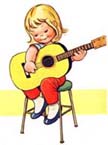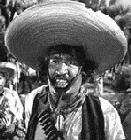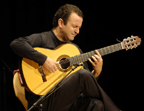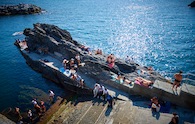Welcome to one of the most active flamenco sites on the Internet. Guests can read most posts but if you want to participate click here to register.
This site is dedicated to the memory of Paco de Lucía, Ron Mitchell, Guy Williams, Linda Elvira, Philip John Lee, Craig Eros, Ben Woods, David Serva and Tom Blackshear who went ahead of us.
We receive 12,200 visitors a month from 200 countries and 1.7 million page impressions a year. To advertise on this site please contact us.
|

|
|
THE IMPORTANCE OF BEING IN COMPAS (AND EDUARDO NIEBLA)
|
You are logged in as Guest
|
|
Users viewing this topic: none
|
|
Login  | |
|

 
JBASHORUN
Posts: 1839
Joined: Jan. 23 2005

|
 THE IMPORTANCE OF BEING IN COMPAS (... THE IMPORTANCE OF BEING IN COMPAS (...
|
|
|
Guys, the Manitas De Plata debate has got me thinking. Just how important is it to keep in compas? For example, is it okay to be "out of compas" as long as it sounds good or if the song becomes better/more listenable as a result? Or is it okay to go out of compas for just a few bars here whilst keeping in compas for the main parts?
I have heard from a few people that compas is the most important part of Flamenco, and anything out of compas is "NOT FLAMENCO!!!". But surely this is quite a rigid rule, and the listener's enjoyment needs to be taken into account. Many of the best minds (past and present, musical and otherwise) have made their mark by not blindly following rules, but thinking freely and innovating. This is not to say that the rules should be ignored, as clearly there are times when they make sense, and compas is the same.
Today I went to a concert by a guitarist called Eduardo Niebla. The guy is a virtuoso guitarist who studied Flamenco. However, he blends Flamenco with jazz and other elements a bit like Gerardo Nunez. Except.... I don't think ANY of his songs were strictly in compas, apart from one song which he specified was a Rumba. But his performance was outstanding, and he used many Flamenco hand techniques to perfection and kept the crowd very happy (This was a small group of fans at the Spanish Cultural Centre, and a long way from the hollywood settings that De Plata played to).
I think this is one instance of the rules being broken with positive consequences. But would welcome other members' views on this matter, as I'm sure many of you are far more knowledgeable and experienced in the matter than myself.
Cheers,
James
|
|
|
|
REPORT THIS POST AS INAPPROPRIATE |
Date Jun. 23 2005 21:14:55
 |
|

   
Mark2
Posts: 1891
Joined: Jul. 12 2004
From: San Francisco

|
 RE: THE IMPORTANCE OF BEING IN COMPA... (in reply to JBASHORUN) RE: THE IMPORTANCE OF BEING IN COMPA... (in reply to JBASHORUN)
|
|
|
|
If you ever want to play flamenco with other people, which is the most fun way to do it, you simply have to stay in compas all the time. Not that you can never go out, but you have to catch the train again real quick, before anyone notices you fell off. You actually need to go futher than that, you have to try to feel comfortable in it so that you can express yourself. In fact, this is more important than anything else-chords, picados, hairstyle, etc. If you can't play guitar at all, but know compas well, you could learn palmas, and fully participate in a juerga, but without it, you simply can't. It is the foundation on which the whole thing is built. Nothing is more wasteful than a guy who knows fifty solos but can't play in compas. With all the help available today, such as Ron's program and computers, it's never been easier to learn the basics.
|
|
|
|
REPORT THIS POST AS INAPPROPRIATE |
Date Jun. 24 2005 0:05:10
 |
|

  
ToddK
Posts: 2961
Joined: Dec. 6 2004

|
 RE: THE IMPORTANCE OF BEING IN COMPA... (in reply to JBASHORUN) RE: THE IMPORTANCE OF BEING IN COMPA... (in reply to JBASHORUN)
|
|
|
In my last solo concert , i played many solo flamenco pieces.
I played in compas in all my pieces, cause thats what i like to do.
BUT, i could have missed beats all night long, and nobody would
have known a thing.
In America, at least, the only people who would blink an eye
are people who already actually play,dance, sing flamenco. And believe me,
that number is low low low.
I could give concerts for years to come in my area, and i sincerely doubt
anybody that knows anything about compas would ever attend my show.
Most people i meet after a show have never even bought a flamenco record.
And even if they did, they still would never be able to tell if my bulerias
is in compas.
For God sakes, i watch Ricardo's bulerias video, and i get lost at some points
in compas cause i'm marveling at his sound!!! And i've been studying bulerias
since i was a teenager!!!
And oh yeah, if you're at a flamenco guitar concert, and you are counting
along with the player, to see if they're in compas, then you should just
get up outta your seat, and go home, cause you're missing the whole
point of music in general.
I dont know why im bothering with this old can of worms!
Just felt like typing i guess. :)
_____________________________
|
|
|
|
REPORT THIS POST AS INAPPROPRIATE |
Date Jun. 24 2005 0:56:34
 |
|

   
Ricardo
Posts: 14938
Joined: Dec. 14 2004
From: Washington DC

|
 RE: THE IMPORTANCE OF BEING IN COMPA... (in reply to JBASHORUN) RE: THE IMPORTANCE OF BEING IN COMPA... (in reply to JBASHORUN)
|
|
|
This can be a touchy subject for some folks, because its easy to say you do or do not need X amount of "compas", but when it comes down to actually playing with people that are good, it becomes obvious who knows or not, and what level they are on. But the thing is, even an audience who does not know flamenco, can "sense" rhythm going on and if it is "tight" or not. Some people might not know what is wrong, but they know if something is sloppy or not tight.
When I first got into flamenco I heared C. Montoya, Manitas con Ca...I mean de Plata, and Sabicas. I did not know about "compas", but I knew about rhythm and style, and I found Sabicas to be on quite a different level than the others. Years later I revisited Manitas, and can make a more fair critique.
There are 2 main things in rhythm for me-tempo and style. Style is a big term and includes dynamics, phrasing, swing, etc. Following the 12 beat structure for example is part of phrasing. There are times in flamenco where it is OK to keep the phrasing, but move the tempo around. This is done most convincingly by a player who has good control over tempo to begin with. I can't say how exactly you can tell this, if the the tempo is moving, but you just can.
But the opposite is not allowed, and that is exactly what Manitas used to record. He was a GREAT rumbero, but chose to record bulerias, solea etc, and he did not understand the phrasing. He had very good tempo and swing, dynamics, etc, but did not get the feel of the phrasing. Not that he played a wrong type of phrasing, rather, he kept changing it randomly. That is not very cool. He did not "get it" or the point of the compas. His sons/nephews had the good sense to stick with what they are good at...rumba. I have met plenty of French gypsies who are very quick to tell people that what they play is not the "real" rumba, but Mantitas' bulerias?...come on.
A lot of rock players play "bluesy" stuff or something close to the blues form, but is it really "THE BLUES"? Of course it does not have to be, in a different genre, but when you ask how important is the rhythm, well, it can literally mean EVERYTHING when it comes to defining and feeling musical forms. In flamenco, compas is the base of MANY forms. Every kind of music has its own "compas". Rhythm is at least 50% of music in general. It is like asking "how important IS the right hand when playing guitar. Do we really need it?"
Ricardo
|
|
|
|
REPORT THIS POST AS INAPPROPRIATE |
Date Jun. 24 2005 6:25:46
 |
|

   
Ron.M
Posts: 7051
Joined: Jul. 7 2003
From: Scotland

|
 RE: THE IMPORTANCE OF BEING IN COMPA... (in reply to JBASHORUN) RE: THE IMPORTANCE OF BEING IN COMPA... (in reply to JBASHORUN)
|
|
|
quote:
I would prefer to just enjoy playing rather than have to think about the theory.
James,
Don't feel alone in that.
So many guitarists all over the world have got to that point, where they like the sound, the chord changes, the Flamenco technique, but wish that there wasn't this weird rhythm thing to deal with as well.
But actually, everything that you like is based on this "weird rhythm" thing, although you don't know it yet.
If all Flamenco was based on straight 4/4 or 3/4, instead of polyrhythms you'd never have heard the guitar phrases that obviously turn you on!
This phrasing springs from the underlying compás...not from fancyful guitar work.
There are heaps of original and creative guitarists from all genres, some of them exteremely talented who can work their way up and down the fretboard at lightning speed... whatever.
But Flamenco es differente. 
That's why it sounds so different to Country and Western, or Blues, or Scottish or Irish Folk Music or whatever...
Flamenco is Flamenco and will always be so.
You really can't mix and match the bits you like (like great chords, rasgueado, fast picado) and leave the rest (rhythm, compás, aire) otherwise no es Flamenco.
It's something else then...really!
cheers
Ron
|
|
|
|
REPORT THIS POST AS INAPPROPRIATE |
Date Jun. 24 2005 22:04:04
 |
|
 New Messages New Messages |
 No New Messages No New Messages |
 Hot Topic w/ New Messages Hot Topic w/ New Messages |
 Hot Topic w/o New Messages Hot Topic w/o New Messages |
 Locked w/ New Messages Locked w/ New Messages |
 Locked w/o New Messages Locked w/o New Messages |
|
 Post New Thread
Post New Thread
 Reply to Message
Reply to Message
 Post New Poll
Post New Poll
 Submit Vote
Submit Vote
 Delete My Own Post
Delete My Own Post
 Delete My Own Thread
Delete My Own Thread
 Rate Posts
Rate Posts
|
|
|
Forum Software powered by ASP Playground Advanced Edition 2.0.5
Copyright © 2000 - 2003 ASPPlayground.NET |
0.078125 secs.
|


 Printable Version
Printable Version













 New Messages
New Messages No New Messages
No New Messages Hot Topic w/ New Messages
Hot Topic w/ New Messages Hot Topic w/o New Messages
Hot Topic w/o New Messages Locked w/ New Messages
Locked w/ New Messages Locked w/o New Messages
Locked w/o New Messages Post New Thread
Post New Thread